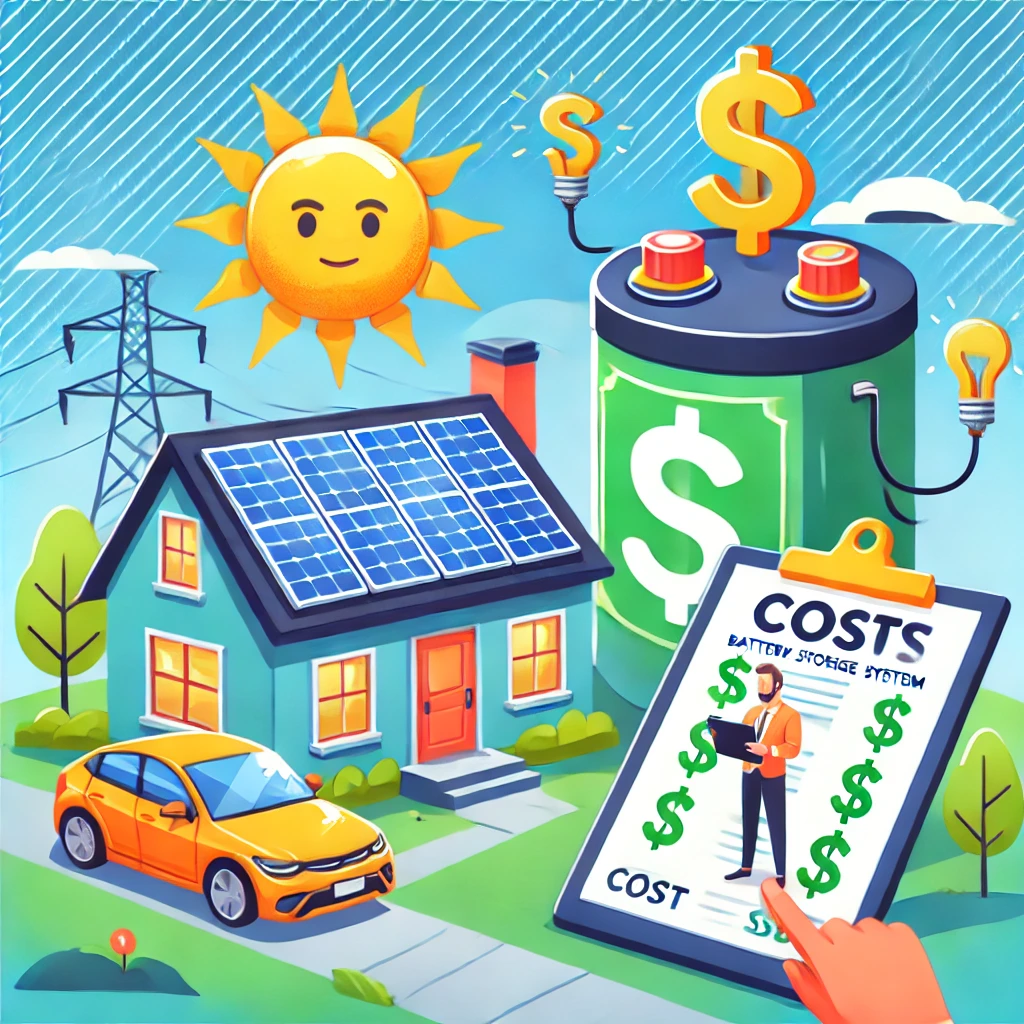As more homeowners and businesses turn to renewable energy, solar panel battery storage systems have become increasingly popular. These systems allow users to store excess solar energy generated during the day for use at night or during power outages, offering greater energy independence and efficiency. But one of the most common questions people have is: “How much do solar panel battery storage systems cost?” In this comprehensive guide, we’ll break down the factors influencing the cost, the different types of systems available, and what you can expect when investing in solar battery storage.
What Are Solar Panel Battery Storage Systems?
A solar panel battery storage system is designed to store the energy produced by your solar panels for later use. Instead of sending all the excess electricity back to the grid, you can store it in a battery and use it when your panels aren’t producing energy, like at night or during cloudy days. This setup can also provide backup power during outages.
Why Invest in Solar Battery Storage?
Investing in a solar battery storage system offers several benefits:
- Energy Independence: Reduce reliance on the grid and protect yourself from power outages.
- Maximize Solar Use: Store excess energy to use later, reducing waste.
- Lower Electricity Bills: Use stored energy during peak hours when electricity rates are higher.
- Environmental Impact: Reduce your carbon footprint by using more renewable energy.
Factors That Influence the Cost of Solar Panel Battery Storage Systems
The cost of a solar battery storage system can vary widely based on several factors. Here are the main components that affect pricing:
1. Battery Capacity and Size
- Capacity is measured in kilowatt-hours (kWh) and determines how much energy the battery can store. The larger the capacity, the more expensive the battery.
- For residential use, systems typically range from 5 kWh to 20 kWh.
Example: A 5 kWh battery may cost around $4,000 – $6,000, while a 13.5 kWh system (like the Tesla Powerwall) could be priced around $9,000 – $14,000.
2. Battery Type
Different battery technologies come with different price points:
- Lithium-Ion Batteries: The most common type, known for efficiency and longevity, but more expensive.
- Lead-Acid Batteries: Cheaper upfront but have shorter lifespans and lower efficiency.
- Flow Batteries: Emerging technology with long life cycles, but higher initial costs.
3. Brand and Manufacturer
Reputable brands often come with a higher price tag but offer better warranties, reliability, and performance.
Popular Brands:
- Tesla Powerwall
- LG Chem RESU
- Sonnen Eco
- Enphase Encharge
4. Installation Costs
Installation costs can significantly impact the overall price of your system. Factors include:
- Labor Fees: Depending on your location and installer.
- System Complexity: Integration with existing solar panels, electrical upgrades, or custom installations.
- Permits and Inspections: Required by local governments, adding to the total cost.
Average Installation Cost: Expect to pay between $1,000 and $3,000 for installation.
5. Inverter and Additional Equipment
- Some systems require a hybrid inverter or additional components to integrate with existing solar setups.
- Costs can add an extra $500 – $2,000 depending on the system requirements.
6. Location and Incentives
- Costs can vary based on local labor rates and market demand.
- Government incentives and rebates can significantly reduce costs.
Examples of Incentives:
- Federal Investment Tax Credit (ITC): Offers a 30% tax credit for solar and battery storage systems.
- State and Local Rebates: Check for additional incentives in your area.
Average Cost of Solar Panel Battery Storage Systems
Here’s a general breakdown of what you can expect to pay for a solar battery storage system:
| Battery Capacity | Battery Cost (Before Installation) | Total Cost (Including Installation) |
|---|---|---|
| 5 kWh | $4,000 – $6,000 | $5,000 – $8,000 |
| 10 kWh | $7,000 – $10,000 | $9,000 – $13,000 |
| 13.5 kWh (Tesla Powerwall) | $9,000 – $14,000 | $11,000 – $17,000 |
| 20 kWh | $14,000 – $20,000 | $16,000 – $23,000 |
Note: Prices vary based on brand, location, and system complexity.
Are Solar Battery Storage Systems Worth the Cost?
Advantages:
- Energy Savings: Reduce your electricity bills by using stored energy during peak hours.
- Backup Power: Stay powered during blackouts or natural disasters.
- Increase Property Value: Homes with solar and battery storage systems are often more attractive to buyers.
- Environmental Impact: Reduce your reliance on fossil fuels.
Considerations:
- High Upfront Cost: The initial investment can be substantial.
- Payback Period: Depending on your energy usage and local incentives, the payback period can range from 5 to 15 years.
- Lifespan: Most batteries last 10 to 15 years before needing replacement.
How to Save on Solar Battery Storage Systems
- Take Advantage of Incentives: Utilize federal and state tax credits to reduce costs.
- Bundle with Solar Installation: Installing solar panels and battery storage together can save on labor costs.
- Compare Quotes: Get multiple quotes from reputable installers to find the best deal.
- Consider Financing Options: Many companies offer solar loans or leasing programs.
- Choose the Right Size: Avoid overpaying for unnecessary capacity by assessing your actual energy needs.
Popular Solar Battery Storage Systems to Consider
Here are some of the most popular solar battery systems on the market:
1. Tesla Powerwall 2
- Capacity: 13.5 kWh
- Cost: $9,000 – $14,000
- Features: High efficiency, sleek design, mobile app integration.
2. LG Chem RESU
- Capacity: 9.8 kWh
- Cost: $7,000 – $10,000
- Features: Compact design, long lifespan, compatible with many inverters.
3. Sonnen Eco
- Capacity: 5 kWh to 20 kWh (customizable)
- Cost: $10,000 – $20,000+
- Features: Premium product with excellent performance and smart energy management.
4. Enphase Encharge
- Capacity: 3.4 kWh per unit (expandable)
- Cost: Varies based on configuration
- Features: Modular design, integrates well with Enphase microinverters.
Final Thoughts
Investing in a solar panel battery storage system is a significant financial decision but offers long-term benefits in energy savings, environmental impact, and energy independence. While the upfront costs can be high, available incentives and decreasing battery prices are making these systems more accessible.
By understanding the factors that influence the cost and exploring ways to save, you can make an informed decision about whether a solar battery storage system is right for your home or business. Always consult with professional installers and consider your specific energy needs to find the best solution.




